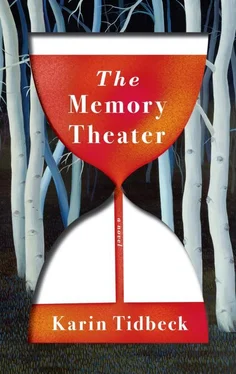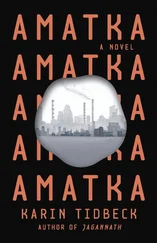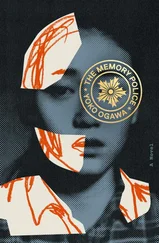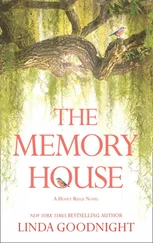“I think it’s time for me to go see it. I have things to do.”
“You’re better off staying here,” Nils said.
“But I want to—”
“I said no!”
The boy shrunk back, and Nils realized he had been shouting.
“I have to try,” the boy said, very quietly. “It’s time.”
“We’ll talk about it in the morning.”
The boy went out to milk the cows. Nils washed the dishes. Why had he been shouting? Why was it so important to keep the boy here? It just was. But this anger didn’t feel like him. Nils had never raised his voice to anyone in his life. He tried to shrug it off, sharpened a pencil, and wrote a shopping list. He’d have to borrow Andersson’s horse and cart if he wanted to get everything home in one go. Maybe see Johanna on the way into town. She would be happy to make him lunch. He should talk to Persson about borrowing his bull while he was in town, too. It was time to have at least Svana covered.
Nils couldn’t really afford to feed another mouth. Except maybe if the owner of that mouth earned his keep. The boy could certainly earn his keep, if only he’d stay.
If only he’d stay. But he’d want to leave as soon as he saw the village.
After all Nils had done for him, the boy had no right to leave. He belonged to this house now. There was that thought again. Why was it important to keep the boy? He just had to. Nils folded up the list, put it in his breast pocket, and picked up a worn sock from the mending basket.
The boy came back inside, bringing the smell of night air and cow dung. He drank the barley coffee Nils had made, sat in silence on the kitchen bench for a while and watched Nils darn the sock, then went to bed.
It wasn’t long before the breaths in the bedchamber lengthened. Nils got up from the kitchen bench and quietly locked the door. Then he went outside, closed the chamber’s window shutters, and barred them with a plank.
The air was cold and clear. Faint waves of green light swept across the sky. It reminded him of something. It made him want to dance. Perhaps the boy would be in a better mood if they had a little party. A real party, with sweets and wine and dancing.
Back in the kitchen, he made himself a fresh cup of barley coffee. He made a new list of things to buy in the village. Sweets and wine. Let them wonder. He didn’t care. Should he see Johanna? Perhaps not. It was too important to get food for the feast.
They were going to have a feast, the boy and he.
The smell of rock. Hard things digging into her back. Dora opened her eyes and saw nothing.
She lay on her side, embedded in something heavy. She could breathe but it was hard to move. Heart pounding, she flexed her arms and legs; they creaked and popped, as if she had lain still for a long time. Dora reached upward with a grunt, digging through the cold mass until her hand suddenly felt nothing. She gathered her legs under her and pushed herself upright.
Dora was standing on a mountainside, in a hollow that had filled with snow. The mountainside above looked like it had collapsed, and she herself was at the edge of the rocks that had spilled out from its wound. The shape of the rockslide was softened by the blanket of snow that covered everything. Below, warped and angry-looking trees dotted the slope.
“Thistle?” Dora called. “Apprentice?”
There was no reply. A few steps away, something like a twig stuck out of the snow. Dora climbed over the rubble toward it. Her limbs were so stiff it hurt. How long had she lain there?
The twig was a near-skeletal arm, wrapped in tatters of blue cloth. Its fingers were missing. Dora flung the rubble aside. Half-covered by a large stone lay a corpse dressed in blue coveralls. Long strands of dark blond hair clung to its skull. Those were Apprentice’s coveralls. That was her ruined face, eyes eaten away, lips receded from her teeth.
“Apprentice?” Dora said.
Apprentice’s corpse stared back at her with empty sockets. She had been so happy about going on an adventure. No more adventures for her now.
“I’m sorry,” she said to Apprentice. “I hope it was quick.” Then she called out, “Thistle?”
The rounded hilltops looked soft, as if smoothed down by giants. A carpet of fir trees covered the valley’s bottom. The cloud cover was thin and low.
“Thistle!” she called again. “Thistle! Thistle!”
A fat white bird on the ground stared at her and wandered off.
Dora walked around the rockslide in a spiral, lifting rocks, searching for traces of Thistle. There were none. No tracks in the snow except for hers. She returned to where Apprentice lay and picked her up. Only the blue coveralls held the body together.
“I’m sorry,” she said to Apprentice. “It won’t be a proper funeral.”
Dora walked to a flat area, put Apprentice down, and dug into the snow with her fingers until she felt hardened dirt. Even frozen, this earth felt familiar . The smell, the feel. It told her that even though it would soften for her, the soil here was too meager for a burial.
Not too meager for her birth. Dora had first come to consciousness in a place like this.
“Wake up,” a voice had said. “Wake up, child.”
And Dora had woken up, climbed out of the soil that smelled and felt just like here. Long hands had caught her. The morning sun had warmed her skin. The tall woman had looked down at her with burning eyes.
“Look at you,” Ghorbi had said. “You’re perfect. Let’s get you to your father.”
Dora shook off the memory and picked up Apprentice again, trudging through the snow away from the rockslide. She would find better ground for Apprentice while searching for Thistle. She would go into the valley. Thistle would have done the same.
Wading through the snow was slow going, but the work made the stiffness go away. Dora’s breath left her mouth in thick clouds. Frost gathered on her eyelashes. Apprentice’s hair swayed in the wind. There were no sounds except those that Dora made, and even those were muted by the snow. She made her way past twisted birch trees that glittered with ice; then the pine forest took over as she came to the bottom of the valley. The snow cover was thinner here, which made it easier to walk. A tree had fallen over, its roots pointing into the sky. Dora dug into the hollow underneath, into the cold ground, and lay Apprentice down. She adjusted Apprentice’s body so that she almost looked asleep. A flat rock under her head and her hair untangled, and it was done. Dora lifted her hands, and the frozen soil enveloped Apprentice’s body. Apprentice would be part of this land now.
The slope steepened slightly as Dora walked farther in among the trees, into a sharp scent of needles and sap. At the very bottom of the valley, a stream flowed down a rocky riverbed, too swift to freeze in the middle. Dora crouched by a little pool, punched a hole through the ice, and stuck her hands in the water. It tasted like she knew it would, of winter and minerals. If Thistle had come this way, he would have stopped to drink, and he would have complained about the cold water. There was a little wooden bridge. Dora crossed it.
—
The light gradually waned, but Dora had no trouble finding her way between the trees; her feet and nose and ears told her what her eyes didn’t, as if she was made for finding her way here. She trudged up the other slope, among firs that stood so close together that Dora saw the opening in the mountainside only when the tree line abruptly ended.
Boulders were piled up and scattered around the hole in the rock. The snow on the ground here was patterned with footprints, human and something else. A light glowed inside. And Dora could hear, faintly, the flat clank of bells.
Читать дальше










![Карин Тидбек - Аматка [ЛП]](/books/438406/karin-tidbek-amatka-lp-thumb.webp)

